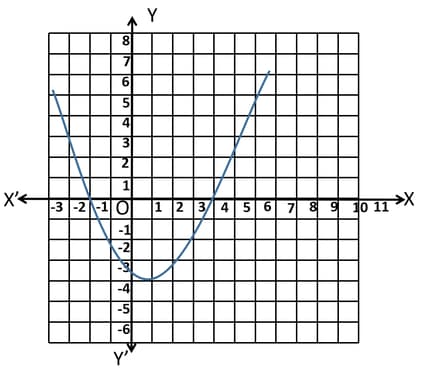Relationship between Zeroes and Coefficients of a Polynomial
Relationship between Zeroes and Coefficients of a Polynomial: Overview
This topic covers concepts, such as, Relationship between Zeros and Coefficients of a Quadratic Polynomial, Relationship between Zeros and Coefficients of a Cubic Polynomial & Formation of Cubic Polynomial with Given Zeros etc.
Important Questions on Relationship between Zeroes and Coefficients of a Polynomial
The product of zeroes of
If are the roots of , then
are the zeroes of , then find the value of
Find the sum and product of the zeroes of the polynomial:
Prashant claims that the polynomial has zeroes. For Prashant's claim to be correct. which of these must be true?
Ankita got an electric wire and she wanted to bend the wire in a mathematical shape. She bent the wire in a shape of a parabola. A parabola has one of the two shapes either open upwards like or open downwards like . The shape made by Ankita is shown in the below figure:

The sum and product of a quadratic polynomials are and respectively, then the zeroes of the polynomial are
If the zeroes of quadratic polynomial are reciprocal to each other than the relationship between and is
If and are zeroes of quadratic polynomial then find the value of .
If , are the zeroes of the polynomial , then find .
If the product of the zeros of the polynomial is , then find the value of .
If one zero of the polynomial is zero, then find the product of other two zeroes.
If and are the zeroes of the quadratic polynomial , then evaluate . If then, write the value of as final answer.
If the zeroes of the polynomial are double in value to the zeroes of , then find the value of .
The zeroes of the quadratic polynomial ,
If one zero of the polynomial is twice the other then find the value of
A quadratic polynomial whose zeroes are and is
If α , β are the zeroes of a polynomial, such that α + β = 6 and αβ = 4, then what is the polynomial equation?
The product of zeroes of the polynomial, ax2 + bx + c, is given by
The sum of zeroes of the polynomial, ax2 + bx + c, is given by
Form the quadratic polynomial in t, whose roots are 2 + √ 5 and 2 - √ 5
